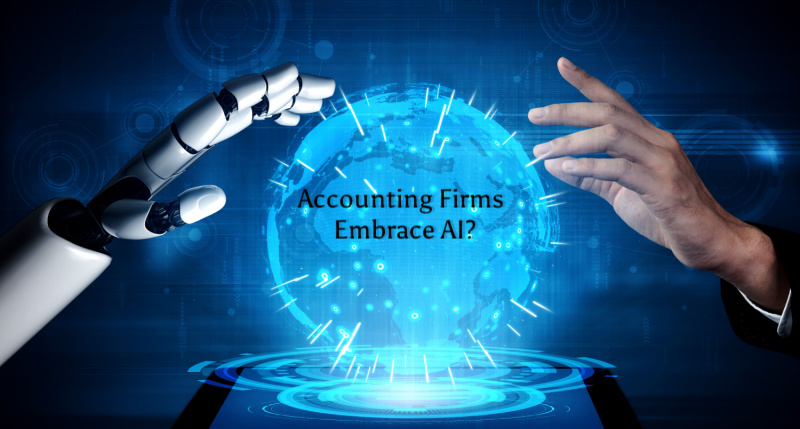The Year 2023: when AI breaks free from Silicon Valley
Over the past decade, big tech companies have developed AI for fraud detection, autonomous mobility, and diagnosing disease. Now, tools such as ChatGPT and Google Bard have brought the technology into our homes.
The democratization of AI has also reached accounting, but you may not know it! Software packages, like QuickBooks, Xero, Dext, and HubDoc, all have AI working behind the scenes to improve product accuracy and speed.
Meanwhile, there is a growing number of AI-focused accountancy startups. For example, In 2022, Docyt, which uses AI to help firms with routine accountancy tasks, completed a $11.5 million Series A fundraising.
Elsewhere, firms have developed proprietary AI solutions to avoid expensive third-party pricing plans.
How can AI empower smaller to medium-sized accountancy practices?
Machine learning, a subset of AI that empowers computer systems to adapt and learn autonomously, can help accountants in several ways:
- Streamlining entries and elevating precision.
- Automating fraud detection
- Crafting predictive models for revenue forecasts to anticipate events such as bankruptcy.
- Enhancing the accessibility and analysis of unstructured data, including contracts and emails.
Case studies: AI and accountancy
To understand the real game-changing nature of AI for accountancy, it’s worth digging deeper into some use cases.
Improving year-end auditing efficiency
Just one-third of year-end auditing involves genuine skill and expertise. The rest comprises repetitive, predictable tasks. However, where there's repetition and predictability, there's room for automation (and where there's automation, there's potential for AI).
SKS’s proprietary software, for example, halves the time it takes to carry out a year-end compliance pack, including audit. One of the ways it does this is by using machine learning to categorize new transactions. For example, it will automatically classify invoices from water companies under ‘rates’.
Simplifying the Chaos of 'Plastic Bag' Accounting
The elite accountancy firms rarely grapple with what we affectionately term 'plastic bag accounting.' This is when clients present a motley assortment of receipts, sales invoices, and handwritten ledgers. AI can accurately recognize and interpret even the scrappiest handwriting on an uploaded document.
Pinpointing inaccuracies and debt management
AI-powered systems can go beyond producing raw profit and loss data to identify irregularities. For example, they can categorize expenses for comparative analysis to reveal significant year-on-year spending discrepancies, unexpected figures, or missing accruals.
Addressing AI skepticism
As tools such as ChatGPT, Midjourney, and Bard reach the masses, apprehensions about AI's fallibility and world-domination ambitions have surfaced. However, within a tightly controlled environment underpinned by robust datasets and fortified by human oversight, AI promises to make accounting operations more efficient and productive for accounting firms and their valued clients.
AI and data security
As AI becomes more prevalent in the accounting sector, there has been increasing concern about data security and privacy. Safeguarding sensitive financial information is paramount, especially when AI algorithms handle intricate data analysis and process confidential client records.
Many accounting firms are now investing in robust cybersecurity measures, incorporating AI-driven threat detection systems that can identify potential breaches in real-time. This intersection of AI and cybersecurity not only ensures data integrity but also enhances client trust and compliance with stringent data protection regulations.
Will AI render accountants obsolete?
AI and automation tools are unlikely to replace accountants but rather augment their capabilities. The advantages are multifold:
Firstly, they unlock cost efficiencies by enabling firms to operate with leaner teams during an industry-wide recruitment crisis.
Secondly, they unshackle accountants from repetitive tasks so they can focus on value-added projects like strategic tax planning, pension consultation, and financial strategy.
Lastly, clients emerge as the ultimate beneficiaries, reaping the rewards of heightened accuracy, reduced fees, and expedited services.
Getting started: three steps to incorporate AI into your accountancy firm
As mentioned above, some legacy accountancy software is already using some form of AI, so the chances are you already are (unwittingly or not) using some form of this technology. If you want to adopt new AI technology, follow these three steps:
1. To avoid chasing tech for the tech’s sake, define your business objectives and goals for adopting AI. What specific problems or opportunities do you want it to address?
2. Consider budget and resources. Will a monthly or yearly plan leave your firm exposed to price rises? How easily will the technology integrate into your existing systems? How much human resources will it take to launch?
3. Carefully evaluate AI software vendors. Research their reputation, reliability, customer support, and track record. Seek recommendations and reviews from other firms that have adopted similar AI solutions. Ensure suppliers meet industry compliance standards.
.png?width=150&height=63&name=TWRlogo-regmark_blueblack%20(1).png)
.png)










Do you have questions about this article? Email us and let us know > info@woodard.com
Comments: